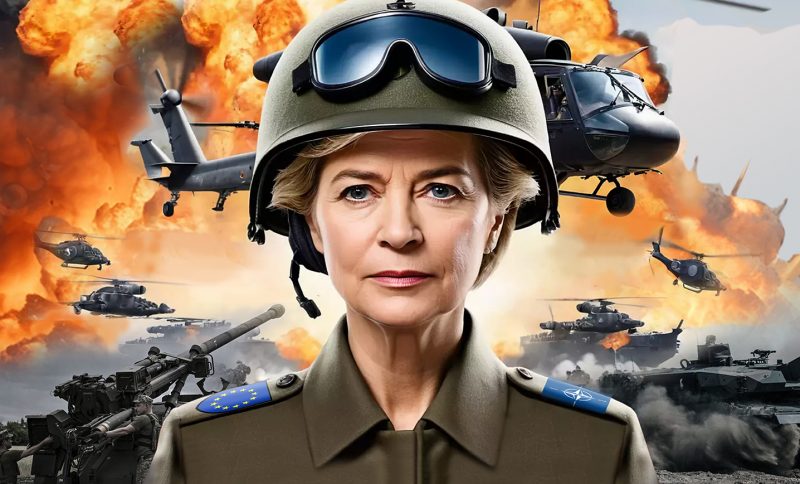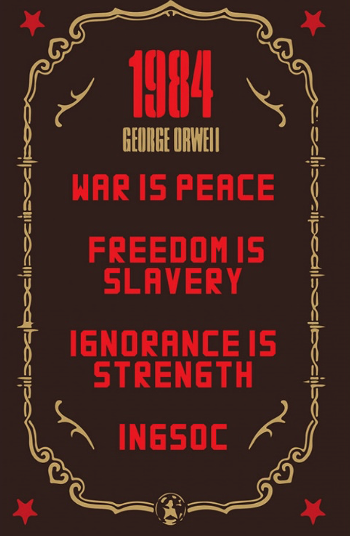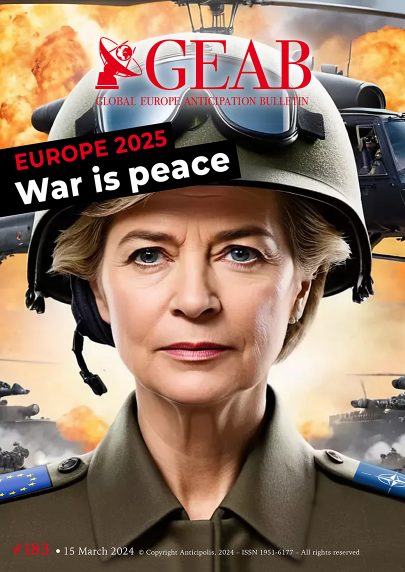GEAB 183

© Kerozen Concept (AI generated image)
Will the European project survive the Orwellian moment in which it finds itself entangled? The European Union, long asserting itself as the sole guarantor of peace on the continent, now appears ready to deploy its operations in service of war, all in the name of securing peace, of course.
In George Orwell’s seminal novel “1984,” he envisioned a dystopian world where words were twisted by totalitarian regimes, with the motto “War is Peace”[1]. When the EU, once hailed as the embodiment of European peace, prioritises the financing of war through the revival of its defense industry, are we to see this as “Peace is War”?
The European institutions and their representatives seem to have overlooked the fundamental truth that peace should never be taken for granted, despite ample warnings. In 2006, Franck Biancheri, founder of the GEAB, starkly reminded us that “Europe’s history has taught us that dreams and nightmares are the two faces of the same coin. Those absolute slogans, “Europe makes Peace”, where one cannot find any room for doubts, questions, uncertainties, are projecting a completely opposite vision of the future”[2].
So here we are, the future is reversing[3].

Figure 1 – Illustration of the full slogan of INGSOC, the totalitarian power in George Orwell’s novel. Source: UAU Posters
In our January issue, we mentioned that 2024 would be marked by the typical wait-and-see attitude of election years. As a result, any escalation of tensions was expected to remain relatively contained until the end of the year. We now anticipate that these tensions, already cracking the European edifice, will plunge it into a full-scale war by early 2025.
This “total” war transcends mere strategic engagements in Ukraine, although the ongoing military confrontation in the region is expected to last. With the current lull in fighting, we anticipate a resurgence in hostilities with increased intensity leading up to the year’s end. Unfortunately, Ukrainians are likely to bear the brunt of this conflict as they become sacrificial pawns in Russia’s containment strategy, fueled by the West’s vested interests in prolonging the war. The only attempts at a diplomatic resolution of the conflict will come from the Global South, but will remain fruitless, at least until 2025.
On the economic front, the EU has just launched an unprecedented plan to revive its defence industry over the long term. This plan reveals both an acknowledgement of Europe’s perceived weaknesses and a strategic intent to use military endeavors to stimulate European industry and bolster the economy, through the defense sector. However, it also underscores the inherent limitations and divisions within European institutions, ultimately reinforcing NATO and benefiting the American defense industry to the detriment of EU unity. These divisions can be seen first and foremost at political level, with the European election campaign getting off to a flying start, with knives being drawn both between and within political parties. While this applies to almost all Member States (Germany, France, Italy, Portugal, Greece, the Netherlands, Romania, etc.), the European parliamentary groups are not exempt from it (take the EPP, for example). In social terms, it will be tricky to hold back the explosion of the bomb. Given the clear understanding at European level that the Security Deal will replace the Green Deal at the end of the elections, the citizens’ social and ecological concerns will be dismissed. The global systemic crisis has reached such depths that it is becoming impossible to prevent open confrontation, and many people are being left behind. This is the future of the European Union that we explore in the article 2025: A Fragmented Europe implodes under the pressure of War.
In the United States, an embodiment of the divisions and tensions can be seen in the generational divide between the presidential candidates and the electoral strength of the younger generation. An old recipe, a new era: the government is calling on a more unifying figure than Joe Biden to mobilise the young electorate. It’s more accessible than thinking of a reform of the representative system… We are therefore dedicating an article to Taylor Swift – American Elections: The generational contrast.
Tensions have reached a critical juncture within the institution considered as the bastion of global peace, the United Nations. The Security Council no longer guarantees the safety of the most vulnerable populations and is less and less a reflection of the international balance of power. Urgent reform is imperative. We present possible scenarios in the article: UN 2024: Reform the Security Council or let it die.
In our exploration of war and confrontation, it’s essential to also consider the potential tools for fostering peace in the future. This month, we venture into an unconventional realm by examining the role of artificial intelligence (AI) in conflict prevention and resolution. Despite its current military applications, we check the possibilities of AI serving as a catalyst for peace processes in our article: 2030 – Artificial Intelligence for Peace.
Amidst the grim specter of fatalistic futures, we remain committed to providing our readers with alternative perspectives. Echoing the words of Franck Biancheri, we believe that the European project, as we have envisioned it and will continue to do so, is based on rationality, on the understanding that it will be difficult, that it will require a lot from the Europeans, that it may fail and that is in an ongoing process with no ‘utopian end’; in a word, it’s a hope, the European hope”.
To read the articles of this Issue, subscribe here.
_______________
[1] The full motto being “War is peace; freedom is slavery; ignorance is strength; “. Source: Wikipedia
[2] Source: Franck-Biancheri.eu, 24/10/2024
[3] Here, we would also refer you to our GEAB 151 of 15/01/2021 (post-Covid) “Through the looking glass”, in which we described how our destinies would be caught up in an extreme tension: “the entire world economy and society going through the digital looking glass – the complete shift of economic and cultural developments from West to East, the reversal of the centre of gravity between Europe and the United States in the transatlantic relationship, the switch of humanitarianism to the cyber-sphere, the loss of generations that knew a time before the Internet, etc”.

Impossible relaunch of the European defence industry, political and social confrontations, strategic disagreements, diplomatic differences... "Until now, Europe has been built out of crises". This has been a historically verifiable [...]
More than 30,000 civilians have been killed in the ongoing Israeli attack on Gaza, yet every ceasefire resolution at the UN Security Council continues to be blocked by US veto, [...]
While two hot controversial conflicts, Ukraine/Russia and Israel/Gaza, are setting the world ablaze on our doorstep, the primary actors involved are unwilling to engage in peace negotiations unless their adversary [...]
She is the muse of American youth, as well as European (and not just English-speaking) and, of course, global youth. Her videos have hundreds of millions of views, her albums [...]
War has a long future ahead of it In line with our article on Europe and Ukraine, we believe that the defence industry has a long and bright future ahead. [...]

Comments